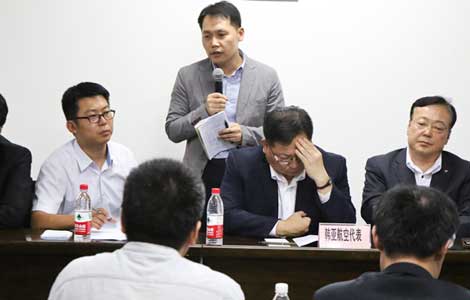Taking the heat off the solar dispute
Updated: 2013-07-19 07:08
By Patrick Schroeder (China Daily)
|
||||||||
Second, an agreement on solar panels will help the EU and China, as key players in climate change negotiations, maintain a good working relation and reach a fair, ambitious and legally binding climate agreement under the United Nations Framework Convention on Climate Change in 2015. If the solar panel issue is not resolved amicably, it will cast a shadow over EU-China relations and could further delay a binding climate agreement at the already protracted climate talks.
Third, an EU-China agreement on solar products can serve as a good example for other countries to resolve their renewable energy trade disputes with China. The resistance to Chinese solar products is not limited to the EU, although its impact is the worst because the bloc accounts for about half of China's solar product exports. The exports of Chinese solar products to the US are already suffering from anti-dumping tariffs.
China also faces a number of potential disputes over solar PV products with other countries, including low-cost manufacturing hubs like South Korea, India and Malaysia. In South Korea, many companies have stopped new investments, because they cannot compete with their Chinese counterparts. And as recently as July 5, India announced that it was launching an anti-dumping investigation into Chinese solar products that have not only displaced Indian products from the EU market, but also captured a large share of the country's domestic market.
And fourth, such an agreement would address the issue of market consolidation and control the overproduction of solar PV products in China. The sector will see some reshuffling necessitated by the overproduction capacity of the solar PV sector, which would have happened even if the EU had not imposed the anti-dumping duty.
This does not mean that the Chinese government should stop supporting the solar products' industry. But instead of supporting the industry to produce mainly for the export market, the government should also promote the development of its internal market, especially by offering incentives for decentralized solar PV panel installations. The government has to adjust its policy to include a feed-in tariff for distributed rooftop solar PV panels for the housing market.
An amicable agreement between the EU and China is definitely possible. To make it a reality, it is necessary for both sides to look beyond the trade issue, to the common challenge of climate change and cooperation opportunities in the transition to green economy.
To tackle climate change on the global level, it is necessary that the EU and China hold negotiations in the spirit of cooperation and openness, and encourage and support each other to increase their domestic capacities to produce and use solar products, and keep the clean energy market functioning.
The author is senior international advisor to the China Association for NGO Cooperation.

 Firefighters hold line against California wildfire
Firefighters hold line against California wildfire
 Rat, rabbit head sculptures on display
Rat, rabbit head sculptures on display
 Detroit files biggest ever US municipal bankruptcy
Detroit files biggest ever US municipal bankruptcy
 Russia jails opposition leader
Russia jails opposition leader
 Plane crash victims' parents seek answers
Plane crash victims' parents seek answers
 'Improving' Mandela marks 95th birthday
'Improving' Mandela marks 95th birthday
 Qingdao eatery finds use for pesky seaweed
Qingdao eatery finds use for pesky seaweed
 From university campus to boot camp
From university campus to boot camp
Most Viewed
Editor's Picks

|

|

|

|

|

|
Today's Top News
Detroit faces uncertain future in bankruptcy
Apple, Google urge surveillance disclosure
Monetary system needs overhaul, says report
US companies seek tougher enforcement of IP laws
Syrian refugees demand help from Kerry at camp
Second iPhone shock leaves man in coma
China's government spends less in 2012
Pregnant Olympic runner dies, baby saved
US Weekly

|

|






